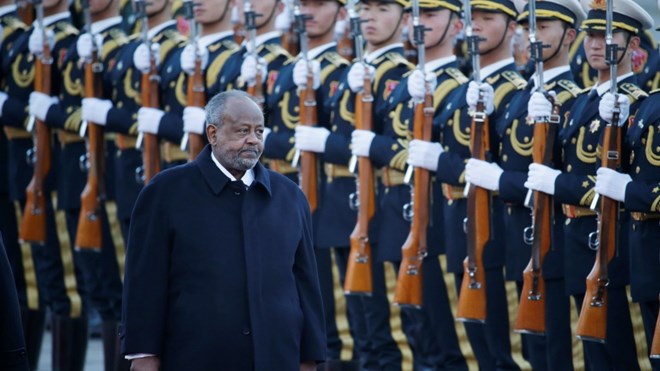Brookings
Tuesday June 16, 2020
By Zach Vertin
China's experiment in Djibouti and implications for the United States

Executive Summary
China’s growing presence in Djibouti has thrust unprecedented attention upon the little-known African port nation and made it a touchstone in the debate over Beijing’s expanding global aims. In 2017, the People’s Liberation Army (PLA) opened its first-ever overseas military base there, at the mouth of the Red Sea, breaking a long-established policy against basing Chinese troops abroad. The new PLA Navy facility overlooks not only a major strategic chokepoint and one of the world’s most heavily-trafficked shipping lanes, but also a major U.S. military base — just six miles away.
The PLA’s arrival has prompted new debate about the evolution of China’s military doctrine, sea power development, and expeditionary capabilities. But it has also brought new attention to Beijing’s economic investments astride the Red Sea region, which precede the base by more than a decade. The combination of Chinese commercial and strategic expansion has generated concern in U.S. national security circles and spotlighted the Red Sea as a potential theater of great power competition.
Djibouti is hot, dry, and boasts few natural resources, but its strategic location and deep-water port complex have drawn not only the American and the Chinese militaries, but also the French, Japanese, Italians, and Spanish — as well interest from Russia, India, and Saudi Arabia. Djibouti is home to just one million citizens, its territory is the size of Vermont, and its GDP, at $3 billion annually, is equivalent to China’s output every two hours.1 The asymmetry between the two countries is hard to overstate, and a combination of big-ticket infrastructure projects and major debt obligations has raised familiar unease about outsize Chinese leverage over Djiboutian assets and decision-making, fueling another round of debate over so-called “debt trap” diplomacy.2
Chinese loans, construction contracts, and infrastructure investments in the Horn of Africa and the wider Red Sea region — most now folded into the much-debated Belt and Road Initiative (BRI) — far exceed those of the United States.3 That gap is due to widen, and underscores a larger difference in the two countries’ approach to date: Washington has viewed Djibouti and the Horn of Africa primarily through a security prism, while Beijing’s prism has been predominantly “developmental.” Who benefits from that development is a matter of some debate.
Djiboutian elites believe Chinese finance, technology, and trade volume can not only propel their country to become the “Singapore of Africa,” but accelerate growth and integration across a vastly underdeveloped region — a narrative echoed by Beijing.4 But skeptics see Djibouti and its neighbors as vulnerable outlets for Chinese excess domestic production capacity.5 They also worry that Djibouti, like other eager recipients of Chinese largesse, might default on its debt and be forced to make concessions to Beijing, a sequence which could threaten vital U.S. interests in the region. As elsewhere, the COVID-19 pandemic and global supply chain disruptions wreaked sudden and severe damage on Djibouti’s trade-dependent economy in early 2020. While it is premature to discern medium or long-term implications, projected contractions in both Djiboutian and Chinese GDP have added a new wrinkle to conversations over Djibouti’s long-term solvency.
Concern among U.S. strategists has been amplified by corruption and poor governance atop Djibouti’s political system, a president whose authoritarian style resembles that of his new patrons, and technological inroads made by Chinese telecommunications firms.6 In this, Djibouti evinces the larger contest between China and the West — marked by different approaches to governance, economic development, and individual liberties.
Download the full report HERE